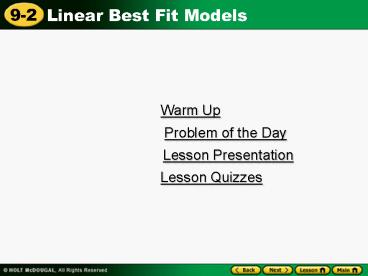Warm Up - PowerPoint PPT Presentation
Title:
Warm Up
Description:
Warm Up Problem of the Day Lesson Presentation Lesson Quizzes – PowerPoint PPT presentation
Number of Views:109
Avg rating:3.0/5.0
Title: Warm Up
1
Warm Up
Problem of the Day
Lesson Presentation
Lesson Quizzes
2
Math Journal (5 Min)
- K-W-L - Each student will be given the title of
the lesson that will be taught that day. They
must then, at the beginning of class, write the
K what they know and W what they want to know
about the lesson before they have been taught the
lesson, and at the end of class, write the L
what they now know (Learned) about the lesson
after they have been taught the lesson. Then,
each student will discuss his/her answers within
their group. Finally, to leave class, each
student will have to give/write 1 sentence that
they learned that pertained to the lesson.
3
Homework Review (5 Min)
4
Warm Up Describe a scatter plot representing
data with the given characteristics.
1. A strong positive correlation or association
between the two variables. 2. A strong
negative correlation or association between the
two variables.
Linear pattern of dots going upward from left to
right.
Linear pattern of dots going downward from left
to right.
5
Problem of the Day The temperature at the base of
a Hawaiian mountain is 75o F. For every 1000-ft
increase in elevation, the temperature drops by
10o F. Describe the association or correlation
between these two variables temperature and
elevation.
negative
6
Textbook Examples (I Do) (5 Min)
7
Learn to identify patterns in scatter plots, and
informally fit and use a linear model to solve
problems and make predictions as appropriate.
8
Vocabulary
clustering
9
When data points in a scatter plot are grouped
more in one part of the graph than another, it is
called clustering. Clustering helps identify
possible relationships between data.
10
(No Transcript)
11
Additional Example 1 Observe the Pattern
A study is conducted to measure the effect of
fatigue on texting speed.
A. Describe the pattern. B. Identify any
clustering. C. Identify any possible outliers.
The scatter plot appears to have a linear pattern.
There appears to be clustering of the data points
at x 10.
There appears to be an outlier data point at x
35.
12
Check It Out Example 1
The sales of fruit bars are shown in the scatter
plot.
A. Describe the pattern. B. Identify any
clustering. C. Identify any possible outliers.
The scatter plot appears to have a linear pattern.
There appears to be an outlier data point at x
1.
There appears to be clustering of the data points
at x 0.25.
13
Additional Example 2 Assessing the Line of Best
Fit
Compare the given scatter plots of data and their
lines of best fit. Tell which model better fits
the data. Explain your answer.
Both scatter plots show data sets that have a
positive correlation.
The points in Graph A are closer to the line of
best fit than in Graph B. The points are closer
and more evenly divided both above and below the
line of best fit.
14
Check It Out Example 2
Compare the given scatter plots of data and their
lines of best fit. Tell which model better fits
the data. Explain your answer.
Graph A has a negative correlation and Graph B
has a positive correlation.
The points in Graph A are closer to the line of
best fit than in Graph B.
15
Additional Example 3 Economics Application
Estimate an equation for the line of best fit,
and tell what the slope and y-intercept represent
in terms of the data it models.
y 20x 130
Players gain about 20 lb/yr and begin at about
130 lb.
16
Check It Out Example 3
Estimate an equation for the line of best fit,
and tell what the slope and y-intercept represent
in terms of the data it models.
y 5x 70
For every hour a student study, their grade
increase about 5. Without studying, most
students would earn a 70.
17
Class work Problems (We Do) (10 Min)
- Pg. 392-393 (1-5)
18
(No Transcript)
19
Small Group CW(Yall Do) (10 Min)
- Pg. 392-393 (6-18 EOE)
20
(No Transcript)
21
(No Transcript)
22
Homework (You Do) (10 Min)
- Pg. 392-393 (7, 9, 11, 13, 15 odd)
23
Math Journal (5 Min)
- K-W-L - Each student will be given the title of
the lesson that will be taught that day. They
must then, at the beginning of class, write the
K what they know and W what they want to know
about the lesson before they have been taught the
lesson, and at the end of class, write the L
what they now know (Learned) about the lesson
after they have been taught the lesson. Then,
each student will discuss his/her answers within
their group. Finally, to leave class, each
student will have to give/write 1 sentence that
they learned that pertained to the lesson.
24
Lesson Quizzes
Standard Lesson Quiz
Lesson Quiz for Student Response Systems
25
Lesson Quiz
Use the scatter plot for Items 14.
1. Does the pattern of association between the
two variables appear to be linear or
nonlinear? 2. Identify any clustering. 3.
Identify any possible outliers.
linear
none
x 3
26
Lesson Quiz
Use the scatter plot for Items 14.
4. Find an equation for the line of best fit, and
tell what the slope and intercept represent.
y -3x 55. For each month on the diet, the
dogs lost an average of 3 lb. On average, the
dogs began at a weight of 55 lb.
27
Lesson Quiz for Student Response Systems
1. Does the pattern of association between the
two variables appear to be linear or
nonlinear?. A. Linear B. Nonlinear 2.
Identify any possible outliers. A. x 0.25
B. x 0.75 C. x 1 D. x 100































